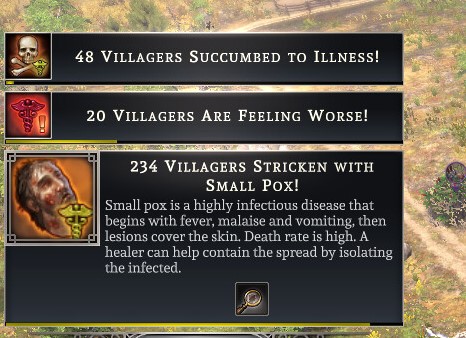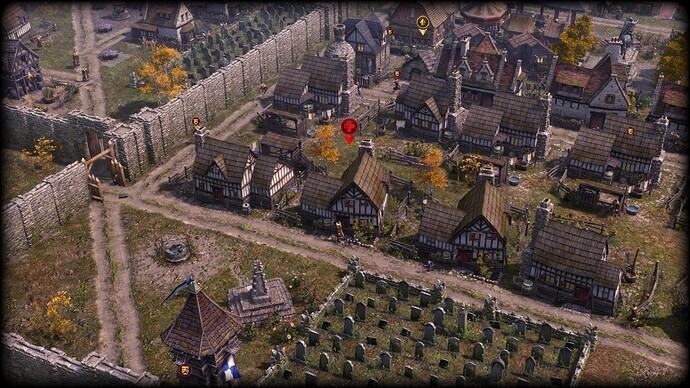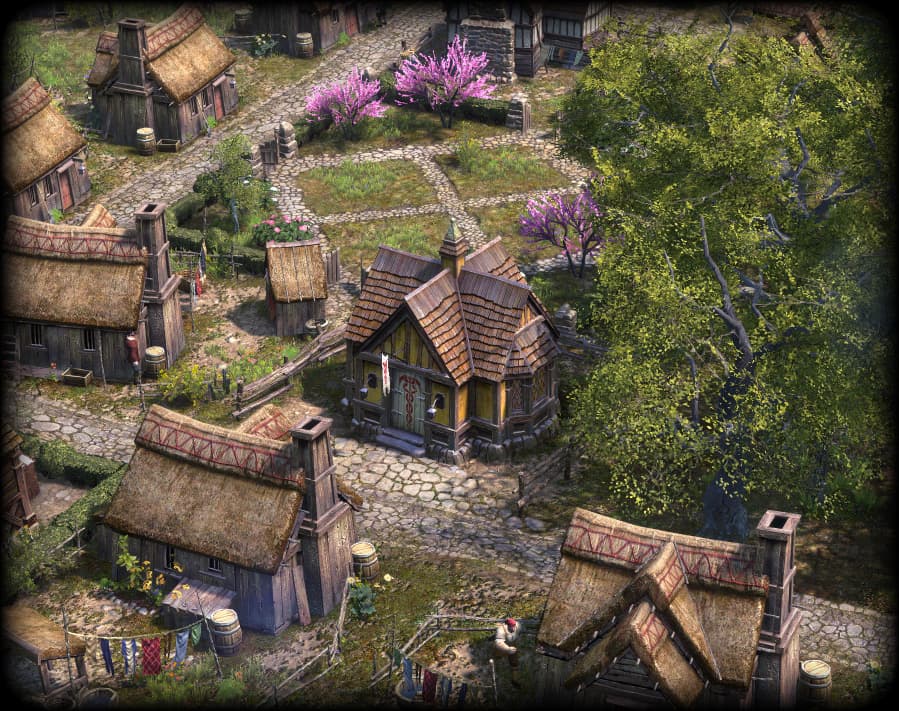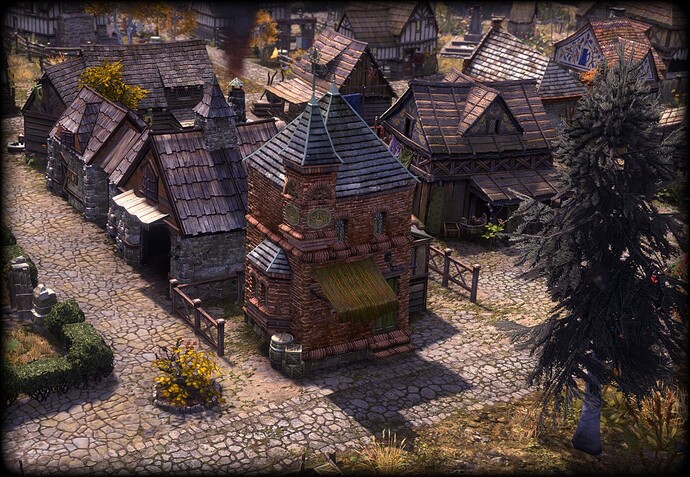A thriving industry marks a turning point for the town. The people are fed and clothed. Raider attacks have become a regular occurrence, but are kept at bay by a dedicated and well-armed military regiment. Yet unseen foes still remain lurking, ones that cannot be stopped by arrow and steel.
Illness can strike villagers in many forms. Drinking water from a nearby lake can increase the risk of acquiring parasites or developing dysentery. Malnutrition from lack of Vitamin C can cause villagers to develop scurvy. Rabies from a rabid wolf bite is often lethal. Others are seasonal, such as the flu or common cold.




Some conditions are not illnesses at all, but occur from injuries. Villagers living without shoes can develop foot injuries or sprained ankles. Workers in mines are at higher risk of breaking limbs. Soldiers risk their lives in combat as every blow has the potential to become a dangerous festering wound.




Not all ailments are deadly and can lead to an eventual recovery, but some can progress into more deadly conditions, for example flu turning into pneumonia or untreated hypothermia developing into gangrene.
![]() Prevention
Prevention
There are a number of methods to minimize and even treat illness in Farthest Frontier. The best solution is of course prevention.
You can avoid water-borne pathogens by providing clean water with Wells. Clearing homes of waste by employing a nightsoil man at a Compost Yard will prove critical to maintaining cleanliness. Likewise, a steady supply of soap will ensure clean conditions and minimize the spread of disease.
Outfitting your people with shoes can mitigate the risk of worms and tetanus; meanwhile, hide coats reduce the risk of developing hypothermia when out in the cold, or rabies from wolf bites.




Rats, if allowed to spread, inevitably lead to bites that can cause rat bite fever (yes, that’s a real thing!). The fleas they carry can lead to an outbreak of one of the deadliest diseases to ever strike the human race: the bubonic plague. A rat catcher and properly stored grain can ensure this tragedy never blights your settlements.
When these measures fail and villagers do get sick, there is still hope for a remedy and eventual recovery.
![]() Treatment
Treatment
When diseases break out within the settlement, a Healer’s House is the best response. This structure is not only a place for treatment, but also a means to quarantine the sick away from the general population and minimize the spread of contagious illnesses.
Sick villagers will seek out the nearest Healer’s House if there is a sick bed available. Villagers that became incapacitated in combat cannot make the journey on their own, but their fellow settlers will see that they are brought to the healer as soon as possible. If the healer is at capacity, they will have to fend for themselves, where they face not only diminished chances of recovery but also the risk of spreading contagious diseases.
A Healer’s House can be upgraded to a Hospital, which has a larger capacity and can provide medicine, a much more effective remedy than herbs and snake oil.
Without a healer in town, villagers have to rely on self-treatment in their homes, which not only increases the risk of complications but makes it much more likely for a disease to spread to others.
Medicine
While some conditions can be treated with time and rest, many benefit from medicine to soothe pain and facilitate the body’s ability to heal.
Herbs are a natural remedy that can help reduce the risk of death in some cases, but they are not potent enough on their own to treat severe conditions. They are the best tool a starting out settlement has, however.




More potent medicine can be produced at an Apothecary Shop using willow, honey, and medicinal roots. Access to medicine can often spell the difference between a lethal combat injury and a full recovery.
Bed-Ridden
Some serious health conditions can cause villagers to become bed-ridden. This is often a temporary state as the villager recovers from whatever ails them, but it can also turn into a permanent crippling disability.
Villagers that are bed-ridden no longer work and do not contribute to the town’s productivity.
![]() Outbreaks
Outbreaks
When supplies run low and sick beds fill up too quickly for the healers to handle, contagious diseases can run rampant in your town. Do not take these invisible foes lightly lest you have an outbreak on your hands!

Eager to learn more about Farthest Frontier? Check back on 07/18/2022 for the next Journey Log!



